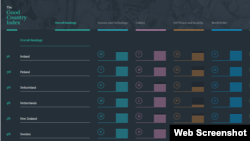A new index, which attempts to rank the countries of the world by their “goodness,” is turning heads.
The Good Country Index is the work of independent policy advisor Simon Anholt and, by his reckoning, Ireland is at the top of the heap in terms of goodness, followed by Finland and Switzerland. Iraq, Vietnam and Libya ranked at the bottom of the 125-country list.
The U.S. came in at number 21, under Italy and above Costa Rica.
Does that mean Ireland is the best place in the world to live?
Not according to Anholt, who tweeted “Some media are calling #goodcountryindex a ‘best country to live in’ survey. No!! It measures countries' contribution to humanity & planet.”
He went a little further on the group’s website.
“The Good Country Index doesn’t measure what countries do at home: not because I think these things don’t matter, of course, but because there are plenty of surveys that already do that,” he wrote.
“What the Index does aim to do is to start a global discussion about how countries can balance their duty to their own citizens with their responsibility to the wider world, because this is essential for the future of humanity and the health of our planet,” said Anholt.
To measure a country’s “goodness,” the index considered several factors, including “science and technology,” “culture,” “international peace and security,” “world order,” “planet and climate,” “prosperity and equality,” and “health and wellbeing.”
The group says it used “35 reliable datasets which track the way that most countries on earth behave.”
Some countries were not included because not enough data was available, according to Anholt.
The index, which Anholt called “enormously tricky,” has yielded some surprising results.
Kenya, for example, was ranked 26th, which many found surprising.
Anholt tweeted his take.
“My favourite result from the #goodcountry Index, Kenya in Top 30. Being a good country isn't about money,” he wrote.
Another example is Malta, which ranks third in the culture category, compared to the U.S., which ranked 41 – just above Trinidad and Tobago. The U.S. appears to have been penalized for lacking “creative services exports.”
A reason some smaller and/or poorer countries rank so highly is because “each country’s score in the Good Country Index is divided by its Gross Domestic Product [GDP] so that smaller and poorer countries aren’t unduly penalized in the ranking for their limited ability to ‘make a difference’ in the world.”
In the international peace and security category, Egypt ranks first, followed by Jordan and several other African and Latin American states. This appears to be because of their participation in U.N. peacekeeping missions and lack of arms sales.
For example, Nigeria, which is dealing with a violent insurgency, is ranked near the top of the index’s international peace category but contributes troops to UN missions.
Anholt told VOA he has not received any “serious academic” criticism of the index, but has been deluged with critics online, saying he’s received 200 to 300 “angry” emails, some up to 4,000 words long, from people asking why their country wasn’t included.
“It never fails to strike me how passionately people feel about their country when they see it in a ranking,” he said. “It stirs up strong feelings.”
One criticism that he’s heard repeatedly is how Russia doesn’t rank last given the recent annexation of Crimea and ongoing tension with Ukraine.
Anholt says the index is a “snapshot what your country was contributing in 2010.”
Even if the data were more recent, Anholt says that for something like the annexation of Crimea, “there’s not an easy way to turn it into numbers.”
He said he is toying with the idea of making the index a living document, and that the “holy grail” would be that it would be able to reflect episodes.”
“This cannot be an academic piece of work,” he said. “There isn’t enough data. The only answer [to criticism] is I’m trying to make a point.”
While the index may be unconventional, Anholt hopes it will stimulate action.
“Today as never before, we desperately need a world made of good countries,” he wrote on the website. “We will only get them by demanding them: from our leaders, our companies, our societies, and of course from ourselves.”
Anholt says that biggest challenges facing the world are “global and borderless,” citing climate change, terrorism, pandemics and others.
“All of these problems stretch across national borders, so the only way they can be properly tackled is through international efforts,” he writes on the website. “The trouble is, most countries carry on behaving as if they were islands, focusing on developing domestic solutions to domestic problems. We’ll never get anywhere unless we start to change this habit.”








